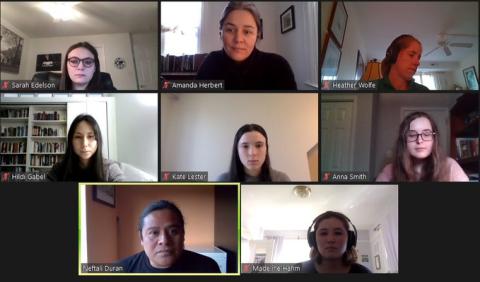Students Examine Early Modern Foodways with the Folger Shakespeare Library
Image

by Eniola Ajao '21
February 12, 2021

In January, five Amherst students--Sarah Edelson '23, Hildi Gabel '21, Maddie Hahm '23, Kate Lester '22, and Anna Smith '22--participated in a research colloquium during which they investigated and analyzed an 18th-century manuscript recipe book from the Folger Shakespeare Library collection.
In years past, student fellows have spent the fellowship at the prestigious Folger Shakespeare Library in Washington, D.C. (The institution was founded by Henry Clay Folger (Class of 1879), who bequeathed the library to Amherst upon his death in 1930.) This year, however, students participated virtually, enjoying esteemed guest lecturers, virtual excursions and lively discussions with one another. Working closely with Folger staff members Drs. Heather Wolfe and Amanda Herbert, the students transcribed, edited, and adapted recipes from the recipe book.
Despite the virtual format, students were enriched by the experience. “The class was an amazing experience, and permanently changed the way I think about food. Everything that we did—transcriptions, virtual field trips, speaking with a variety of experts, class discussions, and more—helped me see just how much food can tell us about ourselves and others,” said Kate Lester ‘22.
Hildi Gabel ‘21 described the Fellowship as “an amazing way to connect to food through time and geography” despite being stuck at home. Gabel transcribed a recipe for “Seed Cake” and in the process learned about sugar production on Caribbean plantations. As students examined recipes in the book, they made note of the ingredients, their sources, and potential users. According to Gabel, one of the most memorable experiences of the fellowship was a talk with “Ozoz Sokoh, an interdisciplinary scholar of food and history, who made me think about culinary and ecological history as deeply connected to legacies of people, and the narratives and power structures that still hold up today.” Gabel credits the course for expanding her understanding of how humans have shaped agriculture and their importance to labor systems and food access.